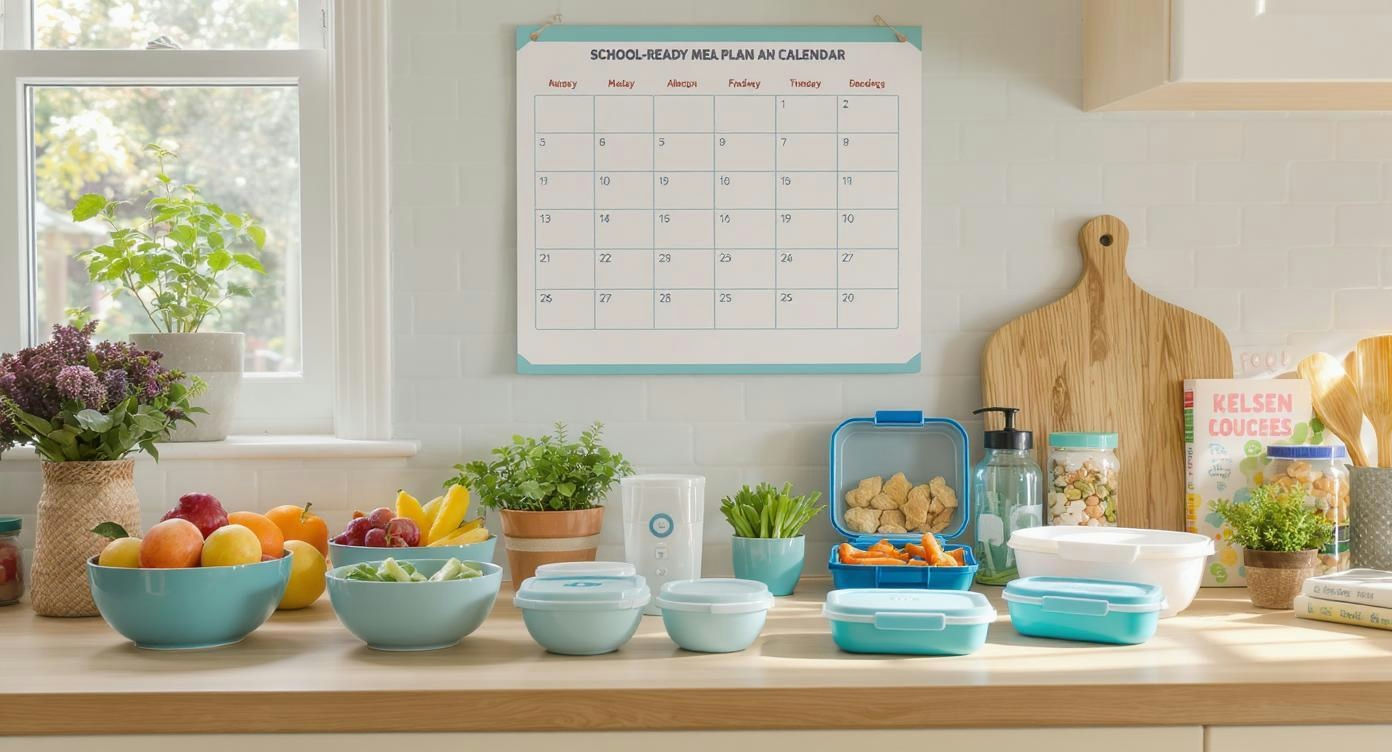The Parent’s Guide to Managing Multiple Food Allergies in Children: Practical Strategies for Home and School
The Parent’s Guide to Managing Multiple Food Allergies in Children: Practical Strategies for Home and School
Living with a child who has multiple food allergies transforms everyday activities into complex challenges. From preparing safe meals to navigating school environments, parents of children with multiple food allergies face a unique set of obstacles that require vigilance, creativity, and advocacy. At Care& Family Health, our Nurse Practitioners regularly support families dealing with these challenges, providing guidance that extends beyond medical management to practical everyday solutions.
This comprehensive guide offers practical strategies for parents managing multiple food allergies in their children. We’ll explore meal planning approaches that accommodate various restrictions while maintaining nutritional balance, school navigation techniques that keep children safe without isolating them, and communication strategies that empower both children and caregivers.
Table of Contents
- Understanding the Challenge of Multiple Food Allergies
- Creating a Foundation for Successful Management
- Practical Meal Planning Strategies
- Navigating School Environments Successfully
- Creative Solutions for Common Challenges
- Building Support Systems and Self-Care
- Staying Current with Research and Resources
- The Role of Healthcare Providers
- Preparing for the Future
- FAQ: Managing Multiple Food Allergies in Children
Understanding the Challenge of Multiple Food Allergies
Managing a single food allergy can be demanding, but when a child has sensitivities to multiple foods, the complexity increases exponentially. Common allergen combinations often include dairy and eggs, peanuts and tree nuts, or wheat and soy. Each additional restriction narrows food options and increases the vigilance required to prevent cross-contamination.
Recent Canadian statistics show that approximately 7% of children have food allergies, with about 2.5% managing multiple food allergies simultaneously. This growing demographic faces significant challenges, as traditional allergy management advice often doesn’t address the complexities of navigating multiple restrictions simultaneously.
Care& Appointment Booking
Need personalized guidance for managing your child’s multiple food allergies? Our Nurse Practitioners offer comprehensive assessments and individualized management plans.
Creating a Foundation for Successful Management
Before diving into specific strategies, it’s important to establish a solid foundation for managing multiple food allergies:
Comprehensive Medical Assessment
A thorough medical assessment is essential for developing an effective management plan. This typically includes:
- Detailed allergy testing (skin prick tests, blood tests, and sometimes food challenges)
- Clear identification of all allergens and potential cross-reactants
- Understanding severity levels for each allergen
- Developing emergency action plans for accidental exposures
At Care& medical clinics, our Nurse Practitioners work closely with families to ensure thorough assessments that inform personalized management strategies. Having a healthcare provider who understands the full picture of your child’s allergies provides valuable support as you navigate daily challenges.
Building Your Support Team
Managing multiple food allergies requires a coordinated approach from everyone involved in your child’s care:
- Healthcare providers: Allergists, primary care providers, nutritionists
- School personnel: Teachers, administrators, cafeteria staff, school nurses
- Extended family and friends: Anyone who might provide childcare or host gatherings
- Support groups: Local and online communities of families facing similar challenges
Practical Meal Planning Strategies
Creating nutritious, appealing meals while avoiding multiple allergens presents a significant challenge. Here are practical approaches for successful meal planning:
Focus on Naturally Allergen-Free Foods
Build meals around naturally allergen-free foods that suit your child’s specific restrictions:
- Fresh fruits and vegetables: Provide essential vitamins and minerals while being naturally free of most common allergens
- Unprocessed meats: Plain chicken, beef, or pork without additives or marinades
- Simple grains: Depending on specific allergies, options like rice, quinoa, or oats (certified gluten-free if needed)
- Legumes: Beans and lentils offer protein and fiber (if not allergic)
Master Substitution Techniques
Learning effective substitution techniques opens up culinary possibilities:
- Egg replacements: Applesauce, mashed banana, or commercial egg replacers for baking
- Dairy alternatives: Plant-based milks and specialty products made from oat, rice, hemp, or coconut
- Wheat substitutes: Gluten-free flour blends, or single-grain alternatives like rice flour
- Nut replacements: Seed butters like sunflower or pumpkin seed butter (if seeds are safe)
Pro Tip: Ingredient Tracking
Use the Care& app’s Health Metrics feature to track successful food substitutions and any reactions your child experiences. This information becomes invaluable during healthcare appointments and when planning new meals.
Implement Batch Cooking and Freezing
Efficiency is key when preparing allergen-free meals:
- Dedicate time each week to prepare larger quantities of safe foods
- Portion and freeze meals and snacks for quick access
- Label everything clearly with contents and preparation date
- Keep an inventory of freezer meals to simplify weekly planning
Create a Rotating Meal Schedule
Develop a system that provides variety while simplifying planning:
- Create a 2-3 week rotating menu of safe meals
- Include breakfast, lunch, dinner, and snack options
- Adjust seasonally based on produce availability
- Incorporate new recipes gradually to expand options
Address Nutritional Gaps
Work with healthcare providers to identify and address potential nutritional gaps:
- Calcium: Often a concern with dairy allergies
- Protein: May need attention with allergies to eggs, dairy, nuts, or legumes
- B vitamins: Can be affected by restrictions on enriched grains
- Omega-3 fatty acids: Often found in foods that may be restricted
A Nurse Practitioner or dietitian can help assess your child’s specific needs and recommend appropriate supplements if necessary. At Care& Family Health, our healthcare team can provide nutritional guidance tailored to your child’s specific allergies and overall health needs.
Schedule a Nutrition Consultation
Get personalized nutritional guidance for managing multiple food allergies from our experienced Nurse Practitioners.
Navigating School Environments Successfully
School presents particular challenges for children with multiple food allergies, requiring careful coordination with staff and strategic planning:
Developing a Comprehensive School Action Plan
Create a detailed plan that addresses all aspects of the school day:
- Emergency action plan: Include symptoms to watch for, medication instructions, and emergency contact information
- Daily management plan: Outline routine procedures for meals, snacks, and classroom activities
- Special event procedures: Address field trips, parties, and school celebrations
- Staff training needs: Identify who needs training on epinephrine administration and allergy recognition
Effective Communication with School Personnel
Establishing clear communication channels with school staff is essential:
- Schedule a meeting with key staff before the school year begins
- Provide written documentation of all allergies, including action plans
- Update information promptly if allergies or protocols change
- Maintain regular check-ins throughout the year
Having your child’s health information organized and accessible is crucial for effective communication with school staff. Use the Care& app’s Health Records feature to store important documents like allergy action plans, test results, and medication lists in one secure location that you can easily share with school nurses and administrators.
Creating Safe Lunchroom Strategies
Develop approaches that keep your child safe during meals:
- Designated seating: Some schools offer allergen-free tables
- Cleaning protocols: Ensure surfaces are properly cleaned before your child eats
- Lunch monitoring: Train lunch supervisors on recognizing and managing potential issues
- Peer education: Age-appropriate education for classmates helps promote understanding
Handling Special Events and Activities
Special occasions often center around food and require advance planning:
- Provide alternative treats for your child during parties
- Create a “safe snack box” to keep at school for unexpected treats
- Work with teachers to incorporate non-food rewards and celebrations
- Volunteer for event planning when possible to ensure inclusion
Empowering Your Child
As children grow, gradually teach them to manage their own allergies:
- Age-appropriate education: Teach them about their specific allergies in terms they understand
- Self-advocacy skills: Practice phrases they can use to decline unsafe foods
- Label reading: Gradually teach older children how to identify their allergens on product labels
- Emergency recognition: Help them recognize their own symptoms and when to seek help
Creative Solutions for Common Challenges
Even with careful planning, families managing multiple food allergies face unique challenges that require creative solutions:
Social Events and Gatherings
Social situations centered around food can be particularly challenging:
- Contact hosts in advance to discuss menu plans and ingredients
- Offer to bring safe dishes to share that everyone can enjoy
- Eat before attending events where food options may be limited
- Create a “party kit” with safe alternatives to common celebration foods
Restaurant Dining
While challenging, occasional restaurant dining is possible with preparation:
- Research restaurant options and allergy policies in advance
- Call during non-peak hours to discuss accommodations with managers
- Bring chef cards detailing specific allergies and cross-contamination concerns
- Consider bringing supplemental safe foods if restaurant options are limited
Track Safe Restaurant Experiences
Use the Care& app’s Notes feature to maintain a list of restaurants that have safely accommodated your child’s allergies. Record which menu items were safe and which staff members were particularly helpful for future visits.
Travel Considerations
Traveling with food allergies requires additional preparation:
- Research grocery stores at your destination
- Pack essential safe foods in carry-on luggage
- Bring a travel-sized cooking set for hotel room meal preparation
- Prepare translation cards describing allergies when traveling internationally
- Research local emergency medical facilities at your destination
Building Support Systems and Self-Care
Managing multiple food allergies can be emotionally and logistically taxing for the entire family. Building support systems is crucial for sustainable management:
Connecting with Other Families
Sharing experiences with others facing similar challenges provides validation and practical tips:
- Join local food allergy support groups
- Participate in online communities specific to multiple food allergies
- Attend food allergy conferences or workshops
- Consider connecting with other families at your child’s school
Addressing Emotional Impacts
The emotional aspects of managing multiple food allergies shouldn’t be overlooked:
- Watch for signs of anxiety in both children and parents
- Address feelings of isolation or difference through open conversation
- Celebrate successes and resilience in managing challenges
- Seek professional support if anxiety becomes overwhelming
At Care&, our Nurse Practitioners recognize that the emotional impact of managing multiple food allergies can be significant. Through virtual appointments and in-clinic visits, we provide support that addresses both the medical and psychological aspects of living with food allergies.
Parent Self-Care Strategies
Caring for a child with multiple food allergies demands significant energy and attention. Parent self-care is essential:
- Schedule regular breaks from food preparation and planning
- Divide responsibilities among family members when possible
- Recognize and acknowledge the challenges you’re managing
- Connect with other parents who understand your experience
Access Support Through Care&
Need additional support managing your child’s food allergies? Our Secure Admin Chat feature allows you to ask quick follow-up questions between appointments.
Staying Current with Research and Resources
The field of food allergy management is constantly evolving, with new research, products, and approaches emerging regularly:
Following Credible Information Sources
Stay informed through reliable sources:
- Food Allergy Canada (foodallergycanada.ca)
- Canadian Society of Allergy and Clinical Immunology (csaci.ca)
- AllerGen NCE Inc. (allergen-nce.ca)
- Your healthcare provider’s recommendations
Exploring New Products and Approaches
Keep an open mind about emerging options:
- New allergen-free product lines
- Improved labeling practices
- Developing treatment approaches
- Technology tools for allergen detection and management
At Care& Family Health, our healthcare team stays current with emerging research and treatment approaches for food allergies, sharing relevant updates with families during both in-person and virtual appointments.
Care&’s Knowledge Base provides access to evidence-based articles on food allergy management that are regularly updated with the latest research. This resource can help you stay informed between appointments and answer common questions as they arise.
The Role of Healthcare Providers
Regular healthcare appointments play a crucial role in managing multiple food allergies effectively. Your healthcare team can:
- Monitor growth and nutritional status
- Update emergency action plans as needed
- Reassess allergies periodically as children may outgrow some sensitivities
- Provide guidance on new management strategies
- Support the emotional aspects of allergy management
Finding a healthcare provider who takes the time to understand your family’s unique challenges is invaluable. At Care& medical clinic, our Nurse Practitioners offer unrushed appointments to thoroughly address the complexities of managing multiple food allergies, providing both medical guidance and practical strategies.
Virtual Appointments
Convenient follow-up appointments from the comfort of your home for ongoing allergy management.
In-Clinic Assessments
Comprehensive in-person assessments for thorough evaluation of food allergies.
Preparing for the Future
As children with multiple food allergies grow and develop, management strategies evolve:
Transitioning Responsibility
Gradually shift age-appropriate responsibility to your child:
- Elementary years: Basic understanding of allergens and simple self-advocacy
- Middle school: Reading labels with supervision and increased self-management
- High school: Independent management with parental support
- College/adulthood: Complete self-management and healthcare coordination
Monitoring for Changes
Food allergies can change over time:
- Some children outgrow certain allergies
- New allergies can develop
- Sensitivity levels may increase or decrease
- Regular reassessment with healthcare providers is essential
FAQ: Managing Multiple Food Allergies in Children
How do I ensure my child with multiple food allergies gets proper nutrition?
Focus on nutrient-dense foods that are safe for your child, and work with a healthcare provider to identify potential gaps in their diet. A Nurse Practitioner or dietitian can help create a nutritional plan that addresses your child’s specific needs, potentially recommending supplements for nutrients commonly found in foods your child must avoid. Regular growth monitoring and nutritional assessments can help ensure your child’s development stays on track despite dietary restrictions.
What strategies help children feel less isolated when they have multiple food allergies?
Create inclusive experiences by focusing on non-food activities during social events, preparing similar-looking safe alternatives to popular treats, and teaching your child positive self-advocacy language. Connecting with other families managing allergies can provide peer support. Consider working with your child’s school to implement allergy awareness education that promotes understanding rather than highlighting differences. As children develop coping strategies, their confidence in managing social situations typically improves.
How can I simplify grocery shopping when managing multiple food allergies?
Develop a master list of safe brands and products that works for your family’s specific allergies. Many parents find success with online shopping services that allow saved lists and easy label checking. Consider joining allergy-specific social media groups where members share newly discovered safe products. While grocery shopping initially requires significant time for label reading, it becomes more efficient as you establish your go-to products and brands that consistently work for your family.
What should I do when my child with multiple allergies is invited to a birthday party?
Contact the host in advance to discuss your child’s allergies and offer to provide safe alternatives or contribute allergy-friendly treats everyone can enjoy. Send your child with a “party kit” containing similar alternatives to typical party foods. For younger children, consider staying at the party to monitor food situations. Work with your child to develop comfort with explaining their allergies and practicing polite ways to decline unsafe foods, emphasizing participation in non-food activities.
How can I find a healthcare provider who understands the complexities of managing multiple food allergies?
Look for providers who offer comprehensive appointments with time to fully discuss your concerns. At Care& Family Health, our Nurse Practitioners provide unrushed medical appointments that allow for detailed discussions about managing multiple food allergies. Our approach includes developing personalized management plans, coordinating with specialists when needed, and offering convenient virtual appointments for ongoing questions and support. Many families find that the continuity of care and accessibility provided by a dedicated healthcare team significantly reduces the stress of managing complex food allergies.
Experience Care& Family Health’s Approach to Allergy Management
Get the comprehensive care and ongoing support your family needs when managing multiple food allergies.
Available for in-clinic visits at our Lawrence Park or Yorkville locations, or through convenient virtual appointments.
Managing multiple food allergies requires diligence, creativity, and support. By implementing practical strategies at home and school, building effective communication systems, and partnering with knowledgeable healthcare providers, families can navigate these challenges successfully. The goal isn’t just to keep children safe, but to help them thrive while developing the skills they’ll need for independent management as they grow.
At Care& Family Health, we’re committed to supporting Toronto families managing complex health challenges like multiple food allergies. Our Nurse Practitioner team provides the time, expertise, and ongoing support needed to develop effective management strategies tailored to your family’s unique needs. Whether through in-clinic visits at our Lawrence Park or Yorkville locations, or convenient virtual appointments, we’re here to partner with you on your family’s health journey.
Less Wait Time, More Face Time
Visit www.careand.ca to register
Disclaimer:
This article is for informational purposes only and does not constitute medical advice. Always consult with a qualified healthcare provider for personal medical guidance. The information provided is general in nature and may not apply to individual circumstances.







